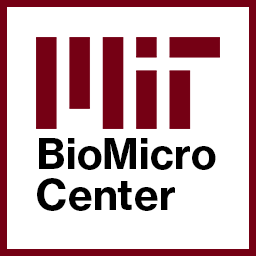BioMicroCenter:NanoPore Library Prep: Difference between revisions
| Line 66: | Line 66: | ||
The BioMicro Center utilizes the SQK-RBK114 kit for tagmentation-based library preparation for dsDNA of large size distributions. Oxford recommends sizes greater than 30 kbp with input of at least 400 ng. The enzymes are bought directly from New England Biolabs. Input is tagmented with adapters and the products are size selected using SPRI beads. Prepared library will be quantified by Qubit prior to loading. | The BioMicro Center utilizes the SQK-RBK114 kit for tagmentation-based library preparation for dsDNA of large size distributions. Oxford recommends sizes greater than 30 kbp with input of at least 400 ng. The enzymes are bought directly from New England Biolabs. Input is tagmented with adapters and the products are size selected using SPRI beads. Prepared library will be quantified by Qubit prior to loading. | ||
<br><br> | <br><br> | ||
This kit can also be used when users are interested in obtaining the longest reads possible. For this protocol, micrograms of clean genomic DNA must be used. No size selection is performed. The PromethION | This kit can also be used when users are interested in obtaining the longest reads possible. For this protocol, micrograms of clean genomic DNA must be used. No size selection is performed. The PromethION P2S has sequenced reads with lengths of 300 kbp+: however, these long reads are rare outliers and the overall read amount for the flowcell in use will be lowered. Higher Molecular Weight DNA seems to kill the nanopores faster and requires a large amount of computing power from the sequencer, reducing the real time speed of basecalling and delaying data delivery. | ||
|} | |} | ||
Latest revision as of 19:25, 20 May 2025
HOME -- SEQUENCING -- LIBRARY PREP -- HIGH-THROUGHPUT -- COMPUTING -- OTHER TECHNOLOGY
Oxford Nanopore Technologies offers a broad variety of methodologies for preparing libraries for sequencing. Pricing includes quality control prior to prep.
Large batches will be undertaken on a custom basis; please email biomicro@mit.edu for more information.
| Summary | Method | Input |
|---|---|---|
| LSK114 | Ligation-based | 1 ug dsDNA |
| RBK114 | Tagmentation-based | 400 ng dsDNA |
| RNA004 | Ligation-based | 500 ng polyA+ mRNA (not totalRNA) |
dsDNA: SQK-LSK114[edit]
|
The BioMicro Center utilizes the SQK-LSK114 kit for most dsDNA library preparation. This kit requires 1 ug of dsDNA and can accommodate a variety of fragment sizes. The enzymes are purchased directly from New England Biolabs or Kapa/Roche. DNA fragments are repaired, A-tailed and ligated to adapters. The ligated products are size-selected using SPRI beads. Prepared libraries can be quantified by Qubit prior to loading. SQK-NBD114 is an extension of this kit which allows for ligation of barcodes prior to pooling and Nanopore adaptor ligation of the pool for sequencing.
|
dsDNA: SQK-RBK114[edit]
|
The BioMicro Center utilizes the SQK-RBK114 kit for tagmentation-based library preparation for dsDNA of large size distributions. Oxford recommends sizes greater than 30 kbp with input of at least 400 ng. The enzymes are bought directly from New England Biolabs. Input is tagmented with adapters and the products are size selected using SPRI beads. Prepared library will be quantified by Qubit prior to loading.
|
RNA: SQK-RNA004[edit]
|
The BioMicro Center utilizes the SQK-RNA004 kit for library preparation with RNA. The enzymes are purchased directly from New England Biolabs. The typical workflow uses first strand synthesis to create a site for ligation--this step can be omitted if necessary, but significantly reduces read amount. Input is ligated with adapters and the products are size selected using SPRI beads. Prepared library can be quantified by Qubit prior to loading.
|

